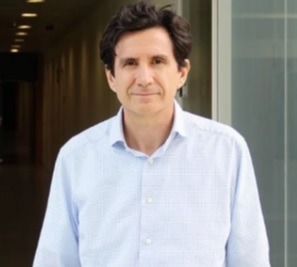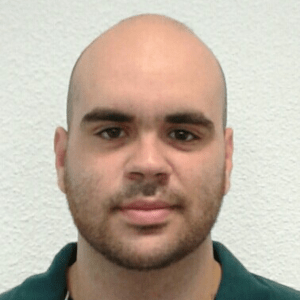Team members (DMIL)
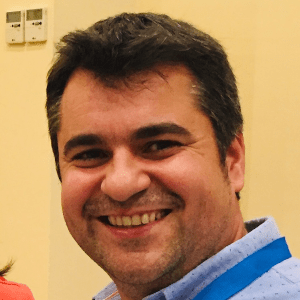
Antonio J. Gonzalez, PhD, Group leader
Research Staff at the Spanish National Research Council (CSIC), at the Institute for Instrumentation in Molecular Imaging. PhD in Physics by the University of Heidelberg (Germany), worked carried out at the Max Planck Institute for Nuclear Physics. He started the research on molecular imaging instrumentation in 2006. He obtained a Ramon y Cajal grant in 2015, and a permanent position at CSIC in 2017. Scientifically coordinated the EU projects MAMMI (FP6) and MINDView (FP7). He recently obtained an NIH R01 award as co-PI. He is leading the Detectors for Molecular Imaging Lab (DMIL).
email: dmil[at]i3m.upv.es
I am a full professor at the Spanish National Research Council. In my early career, I worked in particle detectors at CERN and at the Fermi National Accelerator Laboratory, and later as staff member of the Massachussetts Institute of Technology under the direction of Jerome Friedman. When I returned to Spain in 1999, I started a research group on Medical Imaging, which eventually developed into the Institute of Molecular Imaging and Instrumentation, which I direct.
Tel: +34 96 387 99 07
Email: benlloch[at]i3m.upv.es
Personal web
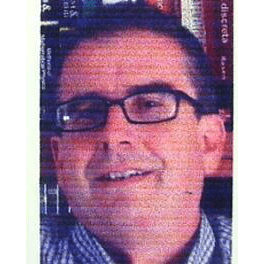
Filomeno Sanchez, PhD, Senior
Dr. Filomeno Sánchez Martínez received his PhD in Physics at the University of Valencia in 1989. He has a permanent position as Research Scientist of the Spanish Council for Scientific Research. Since 2000 is a member of the Physics Medicine Group at the i3M. Recently, he participated in the EU project MINDVIEW. He was the coordinator of the Cardio-PET project, a specific PET system for studying human heart under stress conditions, ended in December 2020. Currently he coordinates the DEEP-BREAST Project, for the development of a continuous edgeless crystal PET system for breast cáncer.

LECOQ Paul, René, Michel , Senior Physicist:
Paul Lecoq has received his diploma as Engineer in Physics Instrumentation at the Ecole Polytechnique de Grenoble in 1972, under the leadership of Nobel Laureate Louis Néel. After two years of work at the Nuclear Physics laboratory of the University of Montreal, Canada, he got his PhD in Nuclear Physics in 1974. Since then, he has been working at CERN in 5 major international experiments on particle physics, one of them led by Nobel Laureate Samuel Ting. Paul Lecoq is the founder of the CERN-based international Crystal Clear collaboration regrouping 31 institutes and companies worldwide contributing to the development of scintillator science. He has also created the SCINT conference series in 1991. Member of a number of advisory committees and of international Societies he has been the promoter in 2002 of the CERIMED. He has been elected in 2008 member of the European Academy of Sciences and in 2017 head of the Physics division of the Academy. He has been awarded an ERC advanced grant in 2013 by the European Research Council. He has been elevated in 2015 in USA to the fellow grade at IEEE. In 2020 he has got a position of Distinguished Professor at the Universitat Politècnica de València (UPV). In 2023 he has been nominated Dortor Honoris Causa of the UPV.

Andrea Gonzalez-Montoro, PhD. Post-doc researcher
Andrea Gonzalez-Montoro, phD in Physics, was born in Valencia (Spain) in 1992. During her 10-year academic career, she has been working on the study and improvement of Positron Emission Tomography (PET) instrumentation.
From 2014 to February 2019, she carried out her master and phD studies at the Institute for Instrumentation in Molecular Imaging (i3M) in Valencia, where she was involved in building dedicated PET scanners. She got her phD diploma in December 2018 with Cum Laude and international distinction. In March 2019, she joined the Molecular Imaging Program at Stanford University as a Postdoctoral Research Fellow where her research focused on the study of TOF-PET detector blocks. In January 2023 she got a Ramón y Cajal postdoctoral position at the Spanish Research council (CSIC) and came back to i3M, where she is involved in the development of trimodal PET inserts and on the design of a detector block for total-body PET scanners. More recently, she got an ERC starting grant for the development of PHOENIX, the first pediatric PET scanner based on BGO scintillators.
Also, she is deeply involved with educational activities, she joined (as organizer and lecturer) the IEEE NPSS EduCom and the WIE community in 2024. She belongs to the NMISC council and, is co-founder and president of the association Women of Science together with the Foundation Spanish Royal Academy of Science.
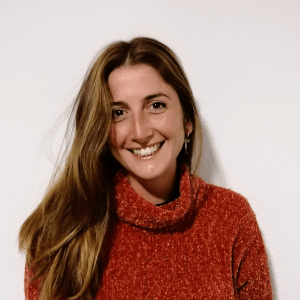
Marta Freire, PhD. Post-doc researcher
PhD in Technologies for Health and Well-Being from Universitat Politecnica de Valencia. MSc in Medical Physics at the Universitat de València. BSc in Physics and BSc in Materials Engineering at the Universidad de Sevilla. She defended her thesis on July 2023 with Cum Laude and International Recognition. She was granted with one predoctoral contract from Generalitat Valenciana. Her area of research is the implementation of new algorithms including machine learning techniques among others, for an accurate gamma-ray impact determination in scintillation monolithic blocks for PET applications.
Reference: CIAPOS/2023/141
Exploración del uso de cristales puro de CsI a temperaturas criogénicas en equipos PET de cuerpo completo
Programa Fondo Social Europeo Plus (FSE+) Comunitat Valenciana 2021 2027
Total budget: €92.470
Bsc in Biomedical Engineering specialized in Medical Imaging at the Polytechnic University of Madrid (UPM). Msc with Distinction in Medical Imaging from School of Biological Sciences, University of Aberdeen (UOA). PhD candidate in Technologies for Health and Wellbeing at the Polytechnic University of Valencia (UPV). His area of research is data analysis, image reconstruction and Monte Carlo simulations.
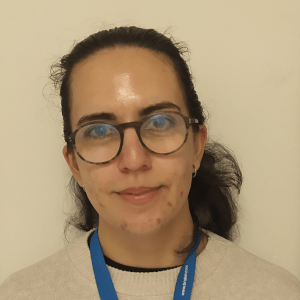
Neus Cucarella, Garantía Juvenil Contract
BSc in Physics and MSc in Medical Physics at the Universitat de València. She was granted with a “Garantía Juvenil” contract in 2018 in the DMIL group. PhD student in Technologies for Health and Wellbeing at the Polytechnic University of Valencia (UPV) program. She has been working in PET instrumentation based on Silicon Photomultipliers (SiPMs) and semi-monolithic crystals, including time of flight (TOF) and depth of interaction (DOI) information.
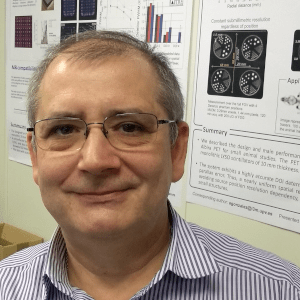
Koldo Vidal, Senior R&D Engineer
Higher Industrial Engineer (1992) from the Polytechnic University of Valencia. In 2006 he joined the IFIC Medical Physics Group in the Mechanical Technical Support tasks. Since 2011, with the creation of the Institute for Instrumentation and Molecular Imaging (I3M), he develops the Mechanical Technical Support functions at the Institute mainly in the Detectors for Molecular Imaging Laboratory.
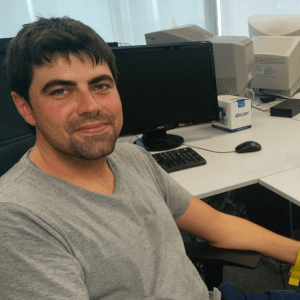
Santiago Jiménez Serrano, PhD, PostDoc and Senior R&D Engineer
Santiago Jiménez Serrano holds a PhD (2023) and has earned multiple advanced degrees: a Master’s in Biomedical Engineering (2013), a Master’s in Artificial Intelligence (2018), and a Bachelor’s in Computer Science Engineering (2011), all from the Polytechnic University of Valencia. Since 2017, he has worked in the PET industry as a software developer, specializing in image reconstruction, calibration, configuration, and GUI systems for commercial PET devices. In 2021, he joined the Institute for Instrumentation and Molecular Imaging (I3M), where he develops software solutions primarily for data processing and image reconstruction related to projects at the Detectors for Molecular Imaging Laboratory.

Riccardo Latella, PhD Candidate at I3M
BSc and MSc in Electronics Engineering from the Polytechnic of Milan (Italy). After an internship at Infineon Technologies, where he worked as an Analog Designer developing a multi-chip low-side laser driver for System On Package LiDAR Applications, he continued as a Test Engineer for a year in the same company. Later, he joined Multiwave Metacrystal S.A. as an R&D Engineer, focusing on ultimate timing testing setups and metascintillator read-out systems. As a PhD candidate at I3M, his research focuses on optimizing data acquisition setups for fast-timing applications in ToF-PET systems and using metascintillators to enhance medical imaging. He has authored several publications, including two as the first author, and is now completing his PhD.
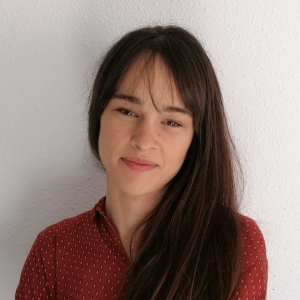
Celia Valladares de Francisco, PhD. Candidate
BSc in Industrial Technologies Engineering specialized in Electronics at Universidad de Sevilla, MSc Industrial Engineering specialized in Product Development at the UPV. PhD candidate in Technologies for Health and Wellbeing at the UPV. At i3M since 2020, her area of research is the development of new PET instrumentation with time of flight (TOF) capabilities based on pixelated crystals and Silicon Photomultipliers (SiPMs). Celia has just started his PhD work at the DMIL team.
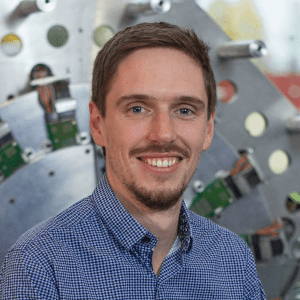
Francis Loignon-Houle, PostDoc
Francis received his BSc in Physics, then his MSc and PhD in Radiation Sciences and Biomedical Imaging at University of Sherbrooke in Canada. He joined the DMIL group in 2023 as a postdoctoral researcher with postdoctoral grants from the Natural Sciences and Engineering Research Council of Canada (NSERC) and the Fonds de recherche du Québec – Nature et technologies (FRQNT). He is working on novel approaches to improve the time resolution of scintillation detectors for time-of-flight PET imaging.
Reference: CIAPOS/2023/133
Tittle: Development of new metascintillators for time-of-flight PET imaging
Programa Fondo Social Europeo Plus (FSE+) Comunitat Valenciana 2021 2027
Total budget: €92.470

Fiammetta Pagano, PhD, PostDoc:
Fiammetta Pagano received her BSc (2018) and MSc (2020) in Physics at the University of Milano-Bicocca (Italy). She carried out her PhD research on the development of radiation detectors for PET at CERN (Geneva, Switzerland) with the University of Milano-Bicocca and obtained the title in February 2024. The same month she joined the DMIL group as a postdoctoral researcher. She is currently working on the development of a brain PET scanner with high-sensitivity, TOF, and DOI resolution in collaboration with the Cornell University (New York). This project is funded by a NIH R01 grant.

Fernando López Berenguer:
BSc in Physics at Universitat Autònoma de Barcelona. MSc in Advanced Physics specialized in Particle Physics at Universitat de València and now is a PhD candidate in Technologies for Health and Wellbeing at the Universitat Politècnica de València (UPV). His area of research is the design and validation of a novel PET insert for simultaneous PET-MRI-FUS.

Álvaro Anreus Valero
BSc in Physics at the Universitat d’Alacant (UA). MSc in Advanced Physics specialized in Nuclear and Particle Physics at the Universitat de València (UV). His area of research is the implementation of algorithms for data analysis using machine learning techniques. He is working with data acquired from the Total-Body PET system installed at Hospital La Fe (IMAS)

Edwing Yair Ulin Briseño, PhD. Candidate
BSc in Biomedical Engineering from the Monterrey Institute of Technology and Higher Education (Mexico) and MSc in Medical Imaging and Applications (Erasmus Mundus) from the University of Girona (Spain), the University of Bourgogne (France), and the Università degli Studi di Cassino e del Lazio Meridionale (Italy). Now a PhD candidate in Technologies for Health and Wellbeing at the Universitat Politècnica de València (Spain). At the DMIL group, his research focuses on applying Deep Learning and Computer Vision techniques to improve Image Quality in Total-Body PET system installed at Hospital La Fe (IMAS).

Óscar Pietrzyk
Bachelor’s degree in Physics and Master’s degree in Advanced Physics with a specialization in Photonics from Universitat de València (UV). Joined the DMIL group with a CSIC JAE Intro scholarship to study scintillator slabs used in PET detectors. Currently working as a research technician on a BGO-based PET scanner for dose verification after proton therapy, as part of the INSPIRE project.
Former members:
– David Sánchez, PhD, PostDoc
– Gabriel Cañizares, PhD. Candidate
– Georgios Konstantinou, PhD. and post-doctoral researcher

